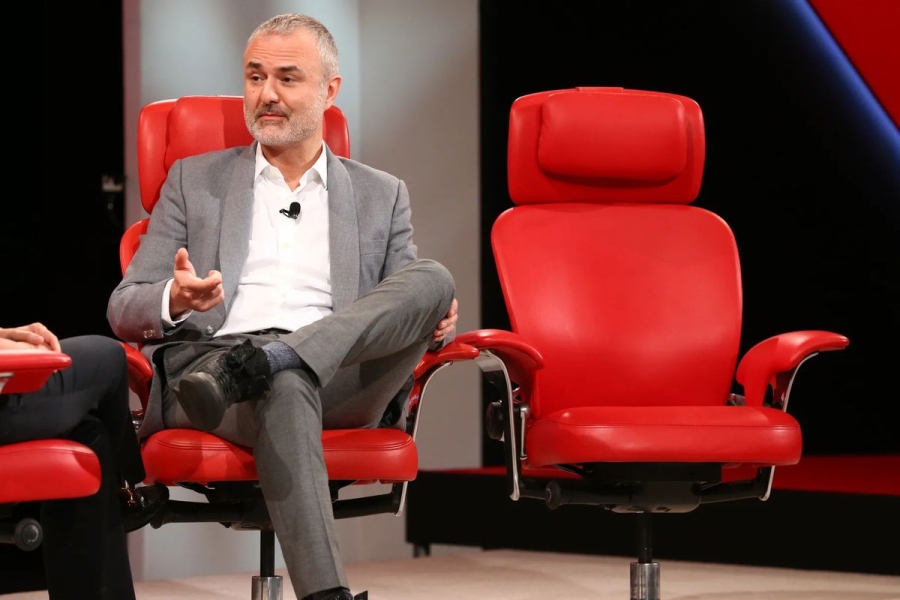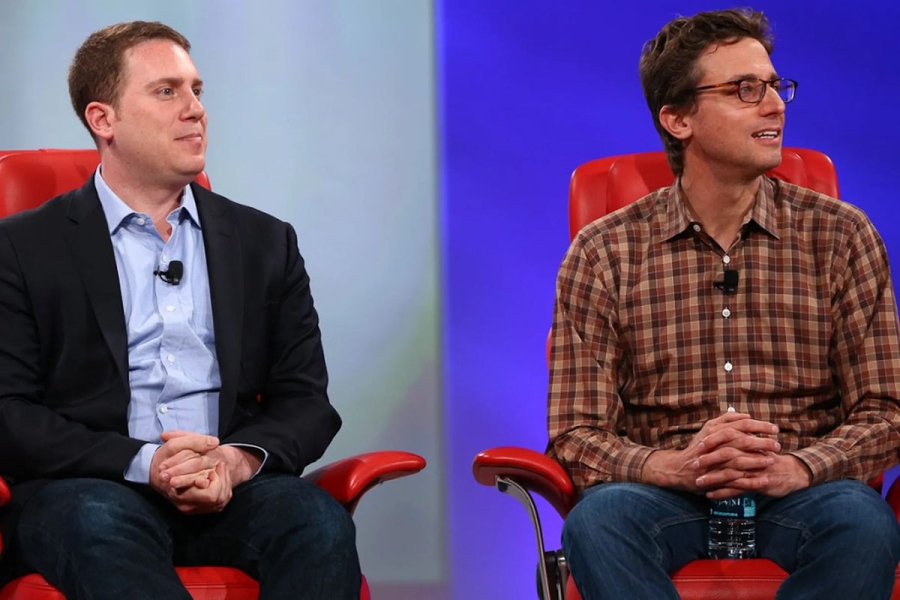A conversation with two media pioneers — plus Ben Smith, whose new book chronicles their rise and fall.

Peter Kafka covers media and technology, and their intersection, at Vox. Many of his stories can be found in his Kafka on Media newsletter, and he also hosts the Recode Media podcast.
Who do we blame for the demise of BuzzFeed News?
This was a news outfit once heralded as the future of journalism, and a bona fide threat to the likes of the New York Times. Now it’s been shuttered because it never made money and its owner says it can’t figure out how it ever would.
For most people, the villains of BuzzFeed News’s story are the same people we blame for the demise of any digital media publication that had its go-go days between 2010 and 2017 or so. You’ve seen lists like this before:
- Misguided media executives
- Rapacious investors
- Fickle platforms like Facebook
And the nice thing about this kind of blame game is that any answer you choose — including all of the above — will be at least truthy. Media founders and executives did raise too much money from investors who did have outsized expectations that were spurred on tacitly and explicitly by the likes of Facebook.
Then when things turned — when it became clear that the money publishers spent generating content meant to engage Facebook’s audience wasn’t going to be covered by advertisers and that Facebook itself didn’t really care whether those publishers were happy about it — things turned quickly.
But you can also look at all of those same facts and reach a different, less comfortable conclusion. Many, if not most, of these publications wouldn’t have existed without the combined collusion by the usual suspects.
The anomaly isn’t that the likes of BuzzFeed News, Mashable, Mic, Vice, and many others have struggled or disappeared entirely in recent years. Vice, for example, is reportedly preparing to file for bankruptcy just a few years after being valued at $5.7 billion. It’s that they were able to get as large as they were — measured by workforce or buzz or valuation — in the first place.
This isn’t a novel insight. And even at the time it was happening — when we collectively told ourselves that this time, money-losing media businesses really could make it up on volume — there were people in the middle of it raising red flags. Gawker Media owner Nick Denton, for instance, didn’t take on venture capitalists’ investments when his peers did, and frequently bemoaned the Facebook fueled-growth of his competitors. (Until he stopped moaning about it and tried it out for himself.)
And Gawker’s eventual demise didn’t come because he’d mistakenly followed a Facebook pivot-to-video or the like: Gawker Media was forced into bankruptcy because billionaire Peter Thiel financed a legal campaign to shutter the company.
But even so, Denton told me recently, Gawker would have been unlikely to have survived the digital media boom of the last decade. “I don’t think anybody really could have made it through intact,” he said.
“I think the big shift was the discovery of digital media as a category and the infusion of vast amounts of capital. That really started with the AOL acquisition of Huffington Post in 2011 and the Andreessen investment in BuzzFeed [in 2014],” Denton explained. “Transactions like that, transactions in the early period of the teens that really caused costs to increase, and caused all of our ambitions to inflate — and ultimately led to a reckoning. In our case, the reckoning of legal costs that we couldn’t withstand, and in other people’s case, other competitive pressures.”
Denton’s comments came during a conversation that I believe most participants didn’t think would actually happen, right up until it did: a podcast taping between Denton, BuzzFeed CEO Jonah Peretti, and journalist Ben Smith, whose book Traffic details the rise and decline of both Denton’s and Peretti’s companies.
Smith was particularly surprised by the chat, since he never spoke directly to Denton himself while reporting his book. Denton, who has kept a very low profile since 2016, only communicated to Smith via text messages and emails.
You can hear the entire conversation — taped a couple days after Peretti announced he was shuttering BuzzFeed News after years of investor pressure to cauterize the money-losing operation — on the newest episode of Recode Media.
Below is an excerpt of the conversation, edited for length and clarity. There’s much more in the full podcast, so find Recode Media on Apple Podcasts, Spotify, Stitcher, or wherever you listen to podcasts.
And yes, this is, in part, a nostalgia exercise, aimed at a not-super-tiny group of people who felt passionately, one way or another, about the likes of BuzzFeed and Gawker a decade ago (I was one of those people because I was both working at and covering digital media startups myself).
But it’s also aimed at people thinking about the next wave of media companies and how they can avoid the pitfalls of their predecessors.
Smith, for instance, is six months into the launch of Semafor, a news startup aimed at plugged-in people and the people who’d like to advertise to those people. And he’s trying to do so when lots of the tools a media startup relied on in the past — referral traffic from Facebook and Google, buzz from Twitter — are severely crippled. Bonus wrinkle: He and his business partner Justin Smith also need to replace $10 million in funding that was supposed to be supplied by former crypto king Sam Bankman-Fried. (Disclosure: In August 2022, SBF’s philanthropic family foundation, Building a Stronger Future, awarded Vox’s Future Perfect a grant for a 2023 reporting project. That project is now on pause.)
Peretti, meanwhile, used to extoll the virtues of making content that lived on Facebook and other platforms he didn’t own. Now he’s preaching about the power of a publisher’s home page, as well as talking up creators and generative AI.
My severely timid prediction: Both Smith and Peretti will have to muddle through something that looks a little bit like what they predicted, while making a lot of accommodations to reality.

Peter Kafka
Jonah, I’m talking to you in late April, a couple of days after you shuttered BuzzFeed News. You had a memo explaining your decision. I want to quote from that because I think it’s relevant to this whole conversation: “I made the decision to overinvest in BuzzFeed News because I loved their work and mission so much. This made me slow to accept that the big platforms wouldn’t provide the distribution or financial support required to support premium free journalism, purpose-built for social media.”
Wasn’t there a way to create a large, important, meaningful, free publication that didn’t require Facebook or Google or another platform to actively support it? Is there some other way you could have pulled this off?
Jonah Peretti
I mean, HuffPost is profitable and doing well. And being able to focus our news efforts for BuzzFeed Inc behind HuffPost made a lot of sense given the way that social has changed.
Although it is true: Over many years, BuzzFeed News lost a lot of money. And I love Ben and I love all the amazing work that we did together. It wasn’t the most fruitful financial partnership. We spent a lot of money defending lawsuits. We had advertisers pull because of our coverage. We spent a lot on amazing journalists and investigations that were beyond, you know, the sort of logic of profitability.
And we did that for a lot of different reasons, but I think when you look at the current environment, the ending of BuzzFeed News is a new beginning for both HuffPost as well as some of the other initiatives that we’re doing with creators and AI and other things that are starting to really grow in the Internet.
Peter Kafka
I want to get to the future in a bit, but just to stick with the past: Is there an alternate version where you create BuzzFeed News but you don’t do it dependent on infusions of investor cash? And so the thing grows slower. You hire less people, you still make great journalism, you just do less of it. And then you have a viable news operation in 2023.
Jonah Peretti
I think there are people who did that. There’s some examples of what you’re describing. We were just excited about this amazing explosion of audience that was happening on these social platforms and the lack of quality news on those platforms and feeling this need of reaching millions of people on the platforms where they were and giving them quality news. And that approach worked for a while.
I think what you’re seeing now is there’s a lot of news fatigue, and people want to navigate directly to news and spend time on news when they’re in the mood for it. And the BuzzFeed business of lists and quizzes and entertainment works great on social.
That business is really working. It’s just [that] news is special and different. It’s more expensive. And it’s also something that people only want in certain moments and not necessarily when they’re trying to blow off steam and entertain themselves and kill time and connect with friends.
Peter Kafka
Ben, your book covers roughly a 15-year span, mostly in New York, when digital media was booming, largely dominated by Gawker and BuzzFeed. And you were there — you were the editor of BuzzFeed News when it was on its ascent. You write in your book: “This book has been, for me, a humbling exercise in what I missed, even when I was there.” What was the one big thing you missed back then?
Ben Smith
Oh, a million things. As Jonah said, there was a real logic when we started BuzzFeed News. We’d had a kind of brand logic and we thought of who BuzzFeed was. But we weren’t thinking about being profitable, and we should have, obviously.
In retrospect, if you had that back, we could have and should have spent less money and made more. Particularly starting in the 2015-2016 period, when it needed to mature. And that’s on Jonah, and it’s on me.
I was a bit of an outsider in the early 2000s, when Jonah was going to cool parties at Nick’s house and I was wishing I was invited. And I copied a lot of Gawker in particular when I was a young political blogger. But I also wasn’t paying that close attention and didn’t really understand what either of these guys was doing in terms of changing the media business, reacting to these huge trends.
To me, some of the most revelatory stuff was looking back at Jezebel in 2007 and just seeing how that kind of blew that whole world of women’s media open — how freaked out by it these powerful glossies were.
Peter Kafka
Remind people who weren’t in that world what Jezebel was.
Ben Smith
So Nick Denton was interested in starting a women’s blog because women’s media is this huge category commercially, among other things. And also it was unbelievably sclerotic and disruptable. And Anna Holmes, who Nick hired, was this very alienated product of the women’s magazines and came in to blow them up. Whether around frank conversations about the way women actually felt or around there not being any black models in the magazines.
Their audience had this unbelievably intense kind of parasocial relationship with them that made them obsessed with their jobs, but also drove them totally nuts. And it felt like, “Oh my God, they were living inside Twitter in 2007” and just the crucible of social media and identity and politics playing out like that. That was almost the first place that I realized it was playing out, which was really interesting to me, and I knew nothing about it at the time.
Peter Kafka
Nick, Ben gives you a lot of credit in the book for seeing the future, even if sometimes you didn’t understand you were seeing the future, like in the Jezebel case.
Obviously, you were forced into bankruptcy because you lost the Hulk Hogan sex tape court case, financed by billionaire Peter Thiel. If we excised that tape from Gawker Media’s history, where is Gawker now? Is it a standalone company? What do you do with Gawker in 2023?
Nick Denton
Are there any companies from the list of digital darlings of that period that still stand completely intact? The Daily Beast is for sale. BuzzFeed News sadly had to cut back. Vice is leaderless. I don’t know whether a Gawker would have made it. Gizmodo might have.
But I think this is a bigger shift, and I don’t think anybody really could have made it through intact.
Peter Kafka
Underline what that shift was. Because for a while, you guys were taking advantage of the fact that you were the shift. Right? You were the upstarts, you were challenging the sclerotic publishers Ben’s talking about. So what’s the shift that would have made it impossible for Gawker to survive in 2023?
Nick Denton
I think the big shift was the discovery of digital media as a category and the infusion of vast amounts of capital. That really started with the AOL acquisition of Huffington Post in 2011 and the Andreessen investment in BuzzFeed in 2014.
Transactions like that, transactions in the early period of the teens that really caused costs to increase, and caused all of our ambitions to inflate. And ultimately led to a reckoning. In our case, the reckoning of legal costs that we couldn’t withstand. And in other people’s case, other competitive pressures.
Peter Kafka
So if digital media sort of remained a kind of a backwater and people with money don’t get excited and don’t decide to invest in it, we’d have a different reality today?
Nick Denton
Gawker had a good four, eight, 10 years without a huge amount of heavily funded competition. I mean, there was the Huffington Post [co-founded by Peretti] — we were definitely very aware of that. And even that amount of competition really changed the nature of the sites that were in the market.
I remember — Jonah, correct me if I’m wrong — but I remember a coffee or a lunch with you at Balthazar, where you said that if Gawker continued to tie our targets to page views — just the satisfaction of our core subscribers — that we were going to miss out on the growth that would come if we targeted unique visitors.
And that seems like a technical distinction. But I feel that my competitive instincts were sharpened in that time. And, you know, we did as you had advised. And we grew as a result. But sometimes I look back at that as being a juncture.
Peter Kafka
That discussion is in Ben’s book, and it seems like a very technical discussion. So why does shifting what a publisher focuses on from page views — the number of times a story is served up to anyone — to uniques, which is theoretically measuring how many times individual people visited a site, why does that matter?
Nick Denton
Before I do that, can I just give Jonah the chance to correct me if my recollection of that was wrong?
Jonah Peretti
No, we did talk about that. And we also had that conversation about the difference between indie rock and hip-hop where …
Nick Denton
Exactly.
Jonah Peretti
… where I was suggesting that Gawker was like indie rock, where any time a band gets popular, you don’t listen to it anymore because it’s sold out if it’s popular. And I was making the argument that media companies should be more like hip-hop, where you don’t sell out, you blow up. And being big and becoming a superstar is part of the goal.
And I think that analogizes to media in an interesting way because the way you monetize something that has a small audience that is very loyal lends itself to subscription. Peter was mentioning before: If you had spent less money, grew slower, and had a subscription model, you could build something much more sustainable.
But then there’s the other approach of “make things that are viral, that blow up culture, that have the maximum amount of impact, that reach new people.” And that was always what got me most excited. And that lends itself to business models that are more about advertising and scale and things where you’re monetizing the fact that you’re reaching. You know, BuzzFeed Inc now reaches the majority of millennials and Gen Z in the country every month because we are still taking that approach of making content that people want to share and consume broadly. And focusing on those big uniques as opposed to getting more page views from that same audience who visits again and again and again.
Nick Denton
To be frank, we were, I think, following to some extent the demands of the ad agencies and the media that would follow the ad agencies. The numbers that we were all measured on were monthly uniques. And there was room for three digital media companies in every journalist’s list. You know, when they would say “digital media companies such as Vox Media, BuzzFeed, and X” — who was going to be in that third position? There’s only room for three, and the three were determined by the monthly uniques. And so that’s what we ended up chasing after we all opted to blow up, so to speak — Gawker more spectacularly than most.
Peter Kafka
Does the story of BuzzFeed and Gawker seem like a book to you?
Nick Denton
Look, it was a scene. It was clearly a scene, and it’s probably worth a book as a scene. It was bigger than just BuzzFeed and Gawker. There was a good long five or 10 years there where, you know, there was a creative ferment and journalists would be hired to or from one place. They would go and start out their own ventures, even. We would complain — the owners would complain — about how pay rates were escalating and how this was looking like an increasingly unprofitable business.
But it was an exciting, lively time. And it’s frankly kind of depressing right now.
Ben Smith
You know how whenever you arrive in a scene, everyone who was there before tells you how amazing it was before you got there and how you missed the really golden time? I got there in 2012, which is actually really toward the end of this. I would put the end in 2016 maybe. But wherever you put it, this huge amount of venture money and this escalating spending in some ways marked the end of this experimental, totally kind of un-self-conscious phase of this.
Peter Kafka
Ben, you’re six months into starting your new thing, Semafor. Is any part of the history you’re digging up [for this book] helping you plot out your course? “I can see what they did there. That was wrong. Let’s do this.” And additionally, lots of the mechanical things that a new publication would have used to launch itself up until a couple of years ago don’t really seem to exist anymore or certainly aren’t useful for publishers.
Ben Smith
Are you referring to Facebook?
Peter Kafka
All of it, really.
Ben Smith
Google continues to exist.
Peter Kafka
They are there. But they are definitely stingy on sending referral traffic. Twitter is its own thing. So how is that affecting what you’re trying to do now?
Ben Smith
The thing that I really, really learned from Jonah — but also learned from kind of obsessing about Nick and writing about them — it’s that you have to start in the moment you’re in. There are huge disadvantages to starting from scratch. Bigger, I think, than I’d realized, in terms of people not knowing your brand and things like that. But the huge advantage is just that you start in the moment you’re in, you’re not freighted with people’s kind of organizational expectations of what a newsroom is supposed to be.
The fact that all these tools that people are using aren’t available anymore is a huge asset to a newcomer. The notion that things are different again and that you can just sort of come out and try to reach people where they are in this moment is basically a big competitive asset compared to people who are doing things the way they’ve been doing them. That have sunk a lot of cost in it and are organizationally connected to it.
The biggest single one of those to me is the extent to which — and this isn’t particularly a media thing — but that people have shifted their attention and their connection tends to be with individuals over institutions. So trying to build a newsroom around individual voices, that feels to me like a big competitive advantage right now and also a way to reach readers.
Peter Kafka
That’s a good lemonade-from-lemons answer. But when you guys break a scoop, aren’t you just wishing, “Oh, man, I wish we could blast this out on Facebook, Twitter, or Google” and get all these eyeballs?
Ben Smith
Yeah. What’s so kind of wild is that Max Tani, our great media reporter, said to me the other day that he’s realized, “I’m looking at the Drudge Report just to see what’s going on. Not to see what Drudge is saying, but just because there’s nowhere anywhere, if you just wake up in the morning you can learn what is happening today.”
Twitter doesn’t do that anymore. Twitter is still pretty amazing to see what is happening on Twitter, but it’s not a good place to figure out what’s happening in the world. And so homepages have sort of come back.
So Max wrote a story about that and got a huge link on the Drudge Report and got a lot of traffic. And it did feel like, “Wow, it’s 2007.”
Peter Kafka
Jonah, I’ve asked you about your non-sale to Disney many times and you always demurred and stonewalled me. Ben finally wrote about it in detail. There’s a great scene of you and Peretti and former BuzzFeed COO Jon Steinberg getting high in Hollywood and Steinberg begging you to sell the company for about $500 million. How much do you regret not selling the company back then? That valuation is much more than BuzzFeed is currently worth. And if you had sold it to Disney, what would BuzzFeed be like now?
Jonah Peretti
A lot of the amazing stories in Ben’s book never would have happened had we sold. The freedom we had and the impact on culture we had and the ability to continue to innovate and change and evolve would have been a lot harder inside of a big company.
I think what Nick was saying about the scene is really important. Everything great seems to come out of an interesting scene. So I saw some of the interesting technology stuff coming out of MIT Media Lab, and went to grad school, which was kind of a scene. I think early New York media was a scene. In LA, BuzzFeed video came out of a scene of all these creators making new kinds of video about their own lives and own experiences. I think there’s a great scene right now in generative AI, which is another interesting area.
But those kinds of scenes, it’s harder to stay connected to them inside of giant corporations. We did a lot of work that I’m really proud of as an independent company. And I’m excited about future work that we’re going to be able to do with more autonomy and freedom as an independent company.
Peter Kafka
Ben, what’s your favorite coulda, woulda, shoulda story from your book? The Disney one gets a ton of attention. But there’s also Mark Zuckerberg wanting to buy Jonah or “acqhire” the company.
Ben Smith
Yeah, I don’t …
Peter Kafka
And Jonah flirting with Ozy founder Carlos Watson.
Ben Smith
Wow, what a missed opportunity that was.
Honestly, I think my regrets are about not understanding the business of news — which is a different and worse business, a harder business than entertainment — better earlier.
I mean, Jonah and I were working on it by the time I left, but it wasn’t my strong suit or experience. My personal regrets are about that.
The Disney thing — I did have one of my colleagues read that excerpt and walk up to me just now and was like, “Hey, so if somebody offers to buy our company for $600 million, you should say yes.” But I actually also don’t have any regrets at all.
Peter Kafka
Nick, you have been out of media since 2016. How have your views about media and particularly transparency in journalism — that was something you were really obsessed with for a long time when you were running Gawker Media — how have those changed now?
Nick Denton
The idea — and it wasn’t really my idea, it was something that was kind of around in the internet scene of 2000 or 2005 — the idea was that if we connect everybody and all information is available, that collectively, through the internet we will piece it all together and come to a better mutual understanding of how the world works, how we can affect change. And the jury is still out that that is for sure.
Peter Kafka
That sounds like an Elon Musk view of the world right now. I’m surprised to hear you say the jury is still out, so you still think there’s hope for: “Let everyone say whatever they want — we’ll sort it all out in the mix.” And then, we’ll end up with a better vision of the world than if we rely on X number of gatekeepers or credentialed people, as we call them now.
Nick Denton
It’s pretty much the view of Silicon Valley now. If you look at Marc Andreessen, one of his most recent essays, he talks about the sharpness of the divide as being a feature, not a problem. And that it’s the old establishment, the old managerial class, that is so afraid of these populist voices and so afraid of argument. I don’t know.
Peter Kafka
I expected you to say, “That’s absolutely wrong. I don’t believe that anymore.“
Nick Denton
You didn’t hear me say that.
Peter Kafka
I did not. Ben, you mentioned Rosencrantz and Guildenstern in your book a couple of times.
Ben Smith
Oh, God.
Peter Kafka
They’re minor characters in Hamlet. They got their own play. What does that allusion have to do with Gawker and BuzzFeed? And you?
Ben Smith
It seems like questionably too pretentious to include. And also, I definitely read it in high school. But there’s a passage — and I assume this is true of every scene, of every thing — where you feel like you are shaping the forces of history. And at some point you realize that you’re riding the tide.
I think actually the folks involved here had a very clear sense — not that they’ve created these sort of digital forces, but they were channeling them. But I do think there was an extent to which at least I was under the illusion that I could control them a lot more than I could.
Peter Kafka
Nick, you are the longest-tenured person in this conversation. You kind of kicked a lot of this off. You get the last word. What’s the future of digital media look like?
Nick Denton
TikTok and Substack.
Well, those are the places where I spend more of my time than anywhere else these days. Maybe I’m extrapolating from my personal habits, but people like Matt Yglesias and Noah Smith, Andrew Sullivan, Glenn Greenwald on whatever platform he’s on now — they have thrived since leaving media organizations. They’re making good money. They’re part of a platform that takes a very thin cut of the total revenues. They’re basically living the old blogging dream.
Update, May 2, 10am ET: Updated to include news of Vice’s reported bankruptcy filing.
Source: vox.com






